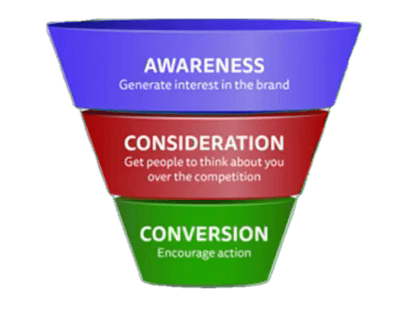We all know about keywords. But why do we target keywords and do keyword research?
Background: Understand the Sales Funnel

Customers usually follow the sales funnel in their conversion journey. A typical sales journey may look like this:
1. Awareness (Generate interest in the brand):
Let's say you're looking for headphones. You know what headphones are, but you do some informational searches to learn more about the similarities and differences between Bose, Apple, Skullcandy, and Beats. This includes price range, features, and drawbacks.
2. Consideration (Get people to think about you over the competition):
After your searches, you have a better idea of what you want. You want bluetooth earbuds with a battery life of 20 hours and optional noise cancelling. You discover Apple AirPods and decide they align best with your interests.
3. Conversion (Encourage action):
You find the model of AirPods you want and purchase them.
The Sales Funnel is important to understand as background for this training and will come up later (see: 3. Flipping the Sales Funnel)
1. Identify the target market
 Before anything, make sure you understand the answer to these three questions:
Before anything, make sure you understand the answer to these three questions:
1. What does the product do?
2. Who wants the product?
3. Why do they want the product?
If you don't understand these questions then there is still work to be done to understand who the target market is.
2. Identify effective keywords
 Effective keywords meet the three criteria:
Effective keywords meet the three criteria:
1. The keyword aligns with our target market.
2. We can rank for it.
3. The keyword makes sense to rank for.
If potential keywords don't line up with these three criteria, they may not be the most effective keywords available.
3. Align effective keywords with the Sales Funnel

With we work in digital marketing, we flip the Sales Funnel upside down. Instead of customers "falling into" conversion, it becomes our job to "drag them up through the funnel" until they are converted. This is done through different "levels" of keywords:
1. High Funnel Keywords (Awareness):
High funnel keywords help generate awareness about products or services. They are purely informational, but help position your brand in the minds of consumers for future consideration.
2. Mid Funnel Keywords (Consideration):
Specific phrases that indicate product or service features. These help consumers match their searches to your offerings.
3. Low Funnel Keywords (Conversion):
Keywords that consists of buying phrases and help customers complete their purchases. These keywords help customers complete purchases when looking to buy.
It is important that effective keywords align with the customer's phase of the Sales Funnel. For example, a customer looking for general information on headphones would probably bounce from a page with keywords targeted towards buying phrases (Low Funnel). On the other hand, customers looking to make a purchase would bounce from pages with purely informational (High Funnel) keywords.
4. Takeaways
1. Begin with the end in mind: "Do you know why somebody would buy this good or service?"
2. Once you understand the target market, you can find effective keywords that attract qualified traffic.
3. Align effective keywords with the Sales Funnel.
Video
